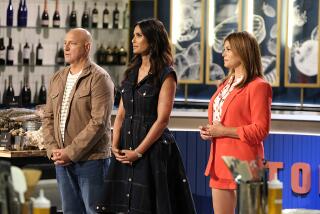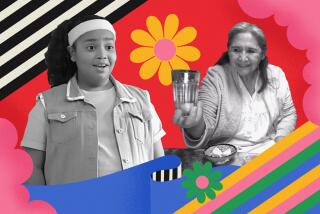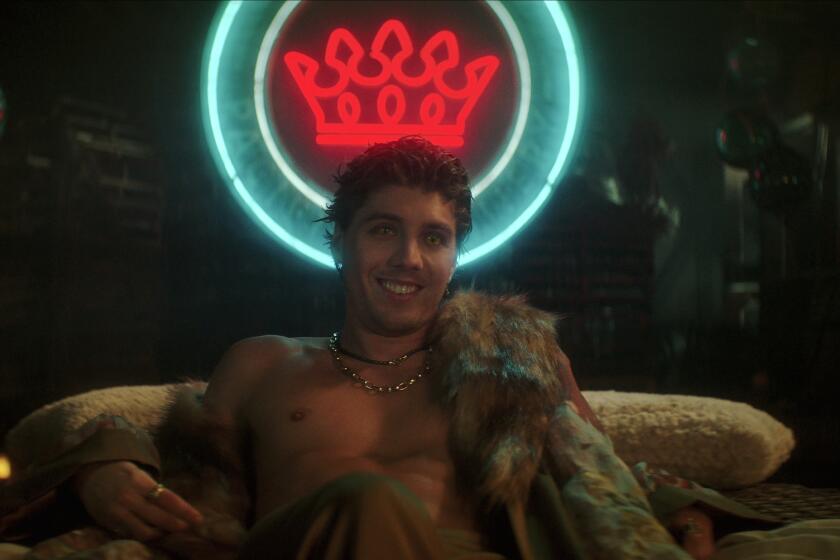Critic’s Pick: TV Picks: ‘Great British Baking Show,’ ‘Mimi and Dona’
“The Great British Baking Show” (PBS, Netflix, Amazon). I know this is a late recommendation — the most recent season of this imported BBC cooking competition finished its PBS run a couple of weeks ago — but I have just got here myself, and though the train has left that station, there are other ways to catch it.
The next-to-last series is available via Netflix and Amazon; some episodes of the latest can be found online via PBS. (Only the last two series, out of six, have shown here.) I might say that I hate reality television — I’m not sure I’ve ever actually said it, but I might say it — but really, it’s just standardized American reality television that I hate, with its manufactured crises and encouraged antagonisms, its restless camera and flash cuts and loud noises. Oh, my poor head!
“The Great British Baking Show,” called “The Great British Bake Off” in Great Britain, is the polar opposite — meditative, observant, loath to impose a narrative where none is needed. It shows you only what it wants to, of course, but it doesn’t tell you what to think or feel -- I do a lot of feeling in the course of an episode -- and it doesn’t continually jump out of the action to comment on the action, instead staying happily in the (admittedly compressed) moment.
NEWSLETTER: Get the day’s top headlines >>
Hosted by comedians Sue Perkins and Mel Giedroyc and judged by bakers Mary Berry and Paul Hollywood — names not created for the show — it’s filmed in an open-air pavilion on the lawn of some big estate the people who live there probably call a country house. The photography has a creamy look, and the show is very beautiful to watch — not prettified so much as attentive.
The bakers come in a refreshingly wide array of ages, and you get to know their faces well. When the camera cuts away from the action — which is generally slow and careful and involves a lot of looking through oven windows to see if the biscuits are burning — it is to shots of sheep and ducks and horses and dandelions; there is bird song on the soundtrack. There is weather.
The contestants are tasked with preparing various sweet and savory baked goods, many of which seem exotic from this side of the Atlantic, where “pie” and “biscuit” mean something else. And with three challenges per episode, there is a lot of actual cookery and food talk going on. The drama is in the prep, the process and the result, not in the competition or spun back story. (You basically root for everyone, which means that at the end of every episode, you’ll be both relieved and sad.)
The bakers do not demean each other, though they have a tendency to quietly deprecate themselves. Additionally, there’s no prize money involved, which makes the whole thing nearly un-American. Indeed, there was an American version, for a single season in 2013, and money — a mere quarter of a million dollars — was part of that deal, as it may be next week, when ABC airs a seasonally themed, four-part “The Great Holiday Baking Show,” with Berry brought over to judge alongside Johnny “Top Chef: Just Desserts” Iuzzini.
“Independent Lens: Mimi and Dona” (PBS, Monday). Sophie Sartain’s film focuses on her grandmother Mimi Thornton and Mimi’s daughter Dona — Sartain’s aunt — who live together (until they don’t) in a house in suburban Dallas. Mimi, who is 92 when we meet her, walks bent at a 90-degree angle but seems otherwise fit for her age, and tough; she’s cared for Dona, who is intellectually disabled, probably autistic, all of Dona’s 64 years.
We get glimpses of their companionable life — trips to McDonald’s and the hair salon, watching game shows on television — and trips back through the family album to establish the poignancy of time. Soon enough, the film runs into the question that prompted its making by Sartain — whose own son is being tested for autism: Who will care for Dona when Mimi no longer can?
This kind of small-scale memoir has become more common as the tools to make broadcast-quality films have become more available and affordable (and one might say, as broadcast standards have widened to meet them). As in many such films, one feels that the subjects’ privacy is being invaded for the sake of pleasing the relative-filmmaker. At the same time, there’s value here, because the changes they’re facing will be familiar to many — already or eventually— as a parent or as a child of aging parents. (One of Sartain’s brothers, who also has an autistic child, says, “I occasionally think to myself, well, I just have to life forever, and outlive him.”) And there’s value because of the intimate, enlarging view the film gives you of a few fellow humans; it’s always good to be reminded of the complexity of people not yourself.
“We all have different abilities,” Mimi writes in her journal. “With encouragement and compliments instead of criticism and being put down, anyone can get along much better with Dona. In that way, she’s very normal. Aren’t we all that way?”
Follow Robert Lloyd on Twitter @LATimesTVLloyd
More to Read
The complete guide to home viewing
Get Screen Gab for everything about the TV shows and streaming movies everyone’s talking about.
You may occasionally receive promotional content from the Los Angeles Times.






